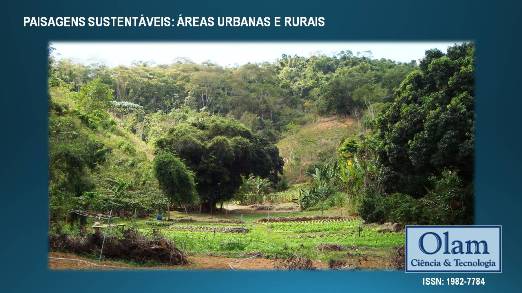RECONSTRUINDO PAISAGENS COM SISTEMAS AGROFLORESTAIS – ABORDAGENS CONCEITUAIS E EXPERIÊNCIAS DE PROUDUÇÃO SUSTENTÁVEL COM CAFÉ ECOLÓGICO
Palavras-chave:
Agroecologia, Agrofloresta, Conservação, Agricultura familiarResumo
RESUMO Os sistemas agroflorestais se constituem em uma estratégia importante de desenvolvimento sócio territorial, pois além de propiciar condições dignas de vida à população rural, como melhoria na alimentação (segurança alimentar) e geração de renda, tem cumprido um papel crucial na recuperação da paisagem natural. A reconstrução da paisagem natural também possibilita um resgate dos conhecimentos socioculturais (conhecimentos tradicionais) amplamente desconsiderados e ridicularizados pela agricultura e ciência, “ditas” modernas, principalmente após o advento da revolução verde, que trouxe uma falsa promessa de alcance de elevadas produtividades e lucratividades ao setor agrícola. As técnicas modernas de produção agrícola deixaram um “rastro” de insustentabilidade, causando diversas consequências sociais e ecológicas em território brasileiro. A dizimação das florestas brasileiras, principalmente de áreas da mata Atlântica e do cerrado, ecossistemas de elevada biodiversidade, para inserção de extensas áreas de commodities agrícolas simplificadas, tem causado consequências irreparáveis no se refere à perda de biodiversidade e diversidade cultural, bem como do tecido social (com o êxodo rural de agricultores familiares e populações tradicionais), contaminação dos recursos hídricos e edáficos com agrotóxicos e fertilizantes sintéticos, dentre outros problemas correlacionados. Dessa forma, o presente trabalho tem como principais objetivos realizar uma discussão teórica sobre o potencial dos sistemas agroflorestais serem adotados como tecnologias capazes de promover o desenvolvimento sócio territorial, por meio da recuperação de áreas degradadas, reconstrução de paisagens e conservação da biodiversidade. Além disso, têm-se como objetivos conceituar e classificar os mais diversos tipos de sistemas agroflorestais existentes, bem como apresentar algumas experiências bem-sucedidas desses sistemas em alguns estados brasileiros. Palavras-chave: Transição Agroecológica. Agroflorestal. Agroecologia. Agricultura Familiar. Sistemas Agroecológicos. ABSTRACT The agroforestry systems constitute an important strategy for socio-territorial development, as well as providing decent living conditions for the rural population, as improved nutrition (food security) and income generation, has played a crucial role in the recovery of the natural landscape. The reconstruction of the natural landscape also enables a ransom of socio-cultural knowledge largely ignored and ridiculed by agriculture and science, "said" modern, especially after the advent of the green revolution, which brought a false-range promise of high yields and profitabilities the agricultural sector. Modern techniques of agricultural production left a "trail" of unsustainability, causing various social and ecological consequences in Brazil. The decimation of the Brazilian forests, especially areas of Atlantic forest and the Cerrado, high biodiversity ecosystems for insertion of large areas of simplified agricultural commodities, has caused irreparable consequences in terms of loss of biodiversity and cultural diversity, as well as tissue social (with the rural exodus of family farmers and traditional populations), contamination of water and soil resources with synthetic pesticides and fertilizers, among other related problems. Thus, this study's main objectives are to perform a theoretical discussion about the potential of agroforestry systems are adopted as technologies that promote socio-territorial development, through reclamation, landscape reconstruction and conservation of biodiversity. In addition, there has to conceptualize goals and classify the most diverse types of agroforestry systems and present some successful experiences of these systems in some states. Keywords: Agroecological Transition. Agroforestry. Agroecology. Family Agriculture. Agro-Ecological Systems.Downloads
Publicado
16-09-2015
Como Citar
Lopes, P. R., Lopes, K. C. S. A., & Kageyama, P. Y. (2015). RECONSTRUINDO PAISAGENS COM SISTEMAS AGROFLORESTAIS – ABORDAGENS CONCEITUAIS E EXPERIÊNCIAS DE PROUDUÇÃO SUSTENTÁVEL COM CAFÉ ECOLÓGICO. OLAM: Ciência & Tecnologia, 15(1-2). Recuperado de https://www.periodicos.rc.biblioteca.unesp.br/index.php/olam/article/view/10336
Edição
Seção
ARTIGOS







